Ramzan, or Ramadan as is called worldwide, is recognized as one of the holiest Islamic months for fasting as ordained by the Quran for all Muslims who have reached puberty and who are able to keep it. ‘Ramzan’ is a Parsi word or the Urdu spelling of the period used mostly by South Asians while “Ramadan” is an Arabic spelling derived from the word ‘ramad’, meaning-excessive heat. The etymology of this Arabic word reflects the blistering hot and dry climatic conditions of the Southern Arabian Peninsula where Islam originated.
Ramzan falls on the ninth month of the Islamic calendar (a Lunar one), “Ramaḍān”, which means the month of fasting and according to the Quran has been decreed to encourage all Muslims to be pious and charitable. On this month of the lunar year, Muslims around the world refrain from eating, drinking, and intercourse between sunrise and sunset. For them, it is a time of meditation and reciting Quran to strengthen their bond with Allah. People renew and purify their faith as this is the month of reflection and self-reformation. Ramaḍān is particularly significant in the Islamic calendar as it was in this month that the first chapters of the Quran were revealed to Prophet Muhammad.
Although fasting is compulsory for all Muslims, the elderly, the sick, people on a journey, and pregnant or menstruating women are exempted from fasting. Because fasting is an act of worship, they are required, however, to make up an equal amount of days later in the year. Those who are unable to do so must feed a needy person for each day that has been missed.
The most common greetings during the month are “Ramadan Mubarak” and “Ramadan Kareem”, which translates to “blessed Ramadan” and “generous Ramadan” respectively.
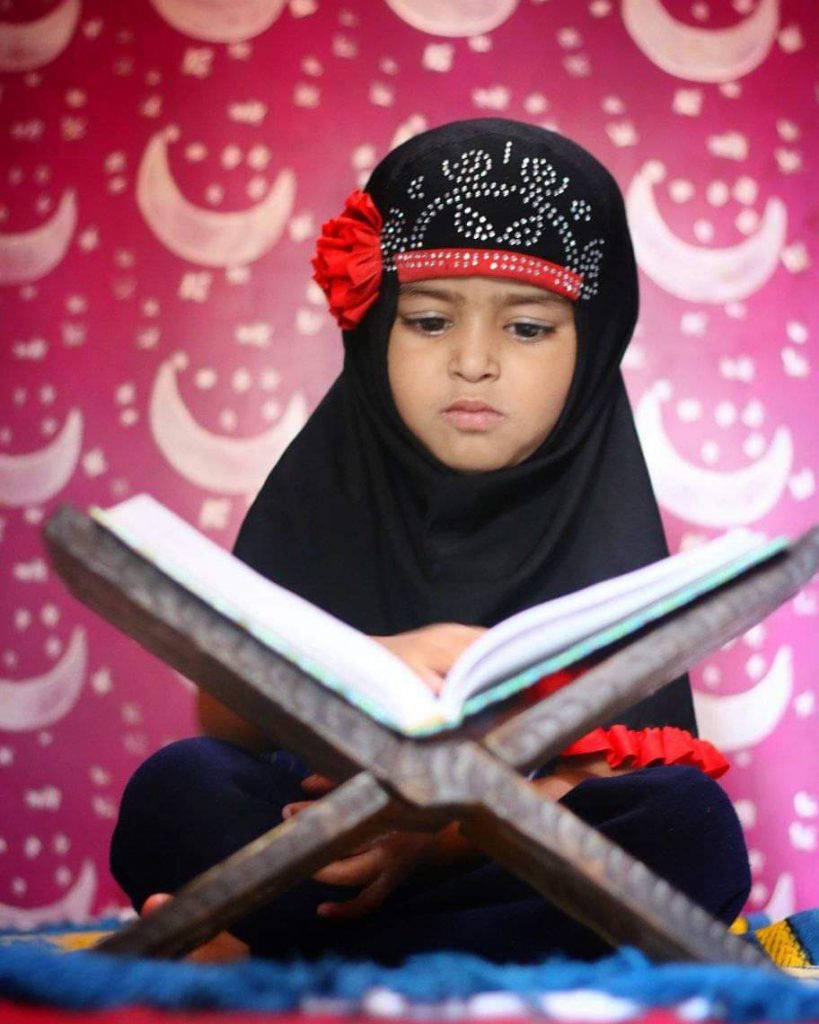
A young muslim girl reading Quran during holy month of Ramzan. Nepalgunj, Banke District. by Nihal Akhtar
Roza, Sheri, and Iftar
During Ramzan, the fast begins at sunrise and ends at sunset, the fasting activity is called “Roza”, Most Muslims rise before dawn and eat their early meal which is known as “Sheri”, then the fast goes on until the sunset. Muslims as an act of worship, refrain from eating, drinking, smoking or taking part in sexual intercourse during Roza. The word “Roza” is derived from the word “Roz” which means “day” or “daily” in Urdu and is of Persian origin.
Celebrants gather at a place or a mosque to break their Roza for the day after sunset and the meal prepared is called “Iftar”. Iftar is the time when fasting Muslims replenish their energy levels by eating rice and chapatis, proteins and dairy, and fruit and vegetables. According to the legend, the Prophet Muhammad broke his fast at the end of each day with a date, therefore eating dates to break the fast is widely practiced by many Muslims.

Jama Masjid (Jame Masjid) is a principal mosque in Nepalgunj, Banke district of Nepal. It’s the place where the city’s Muslims traditionally gather for Friday communal prayer; Jama Masjid is Arabic for “Friday mosque.” by Nihal Akhtar
Tarawih and Zakat
Muslims believe that reciting Quran, and performing good deeds with selfless intentions in the month of Ramzan reaps greater rewards than at any other time of the year.
“Tarawih” (also spelled Taraweeh) is a special prayer that involves reciting lengthy portions of the Quran during long nightly prayers throughout Ramzan. Tarawih which literally means means “to rest and relax” in Arabic is not compulsory but is greatly recommended. It is believed that “Whoever stands with the Imam (prayer leader) until he finishes, it is equivalent to spending the whole night in prayer”. Tarawih prayers begin on the first day of Ramzan and end on its last day and are always performed in the congregation after Isha (time after the last prayer of the day).
“Zakat” is the third pillar of Islam, which refers to the obligatory donations that individual has to make to charitable causes. It is mandatory and also regarded as a high act of worship for Muslims especially during Ramzan, although Zakat can be paid at any time during the year.
“When Ramadan comes, the gates of Paradise are opened and the gates of Hell are closed, and the devils are put in chains.” narrates Abu Hurayrah. That is why it is believed that every good deed done during this month paves the way to heaven only.
Glimpses of Ramzan (Ramadan) at the Jama Masjid in Kathmandu, Nepal
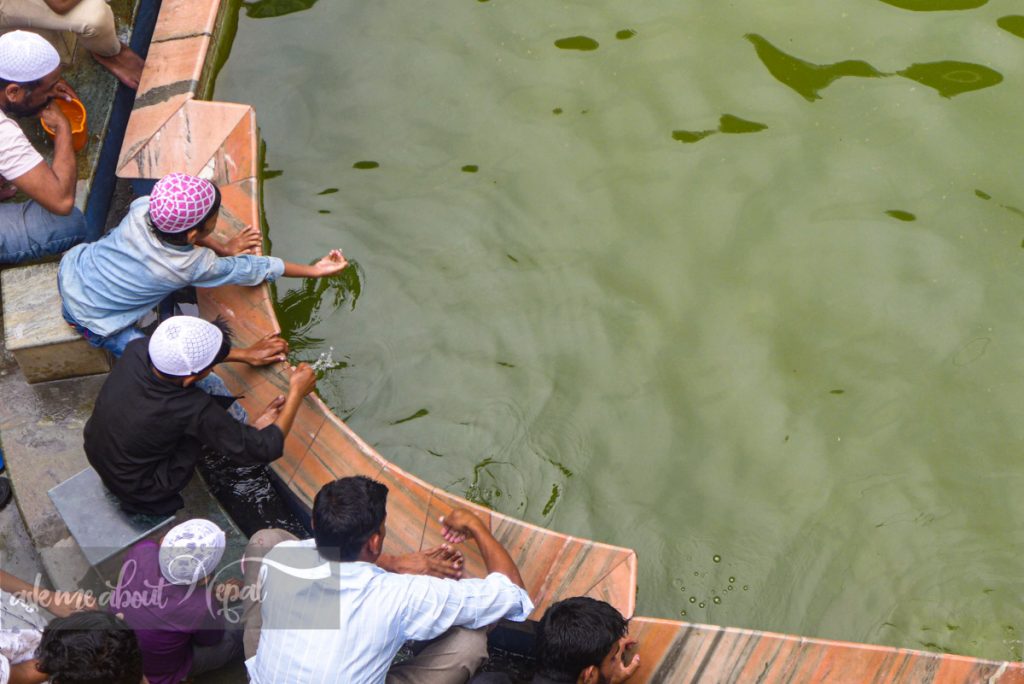
Muslims perform a washing ritual called “Wudhu” before entering the mosque on “Alvida”, the last Friday of Ramzan. Jame Masjid, Kathmandu, Nepal.
Muslims must be clean and wear good clothes before they present themselves before God. Muslims start in the name of God, and begin by washing the right, and then the left hand three times. The mouth is then cleaned three times.

Muslims perform a washing ritual called “Wudhu” before entering the mosque on “Alvida”, the last Friday of Ramzan. Jame Masjid, Kathmandu, Nepal.
Muslims must be clean and wear good clothes before they present themselves before God. Muslims start in the name of God, and begin by washing the right, and then the left hand three times. The mouth is then cleaned three times.
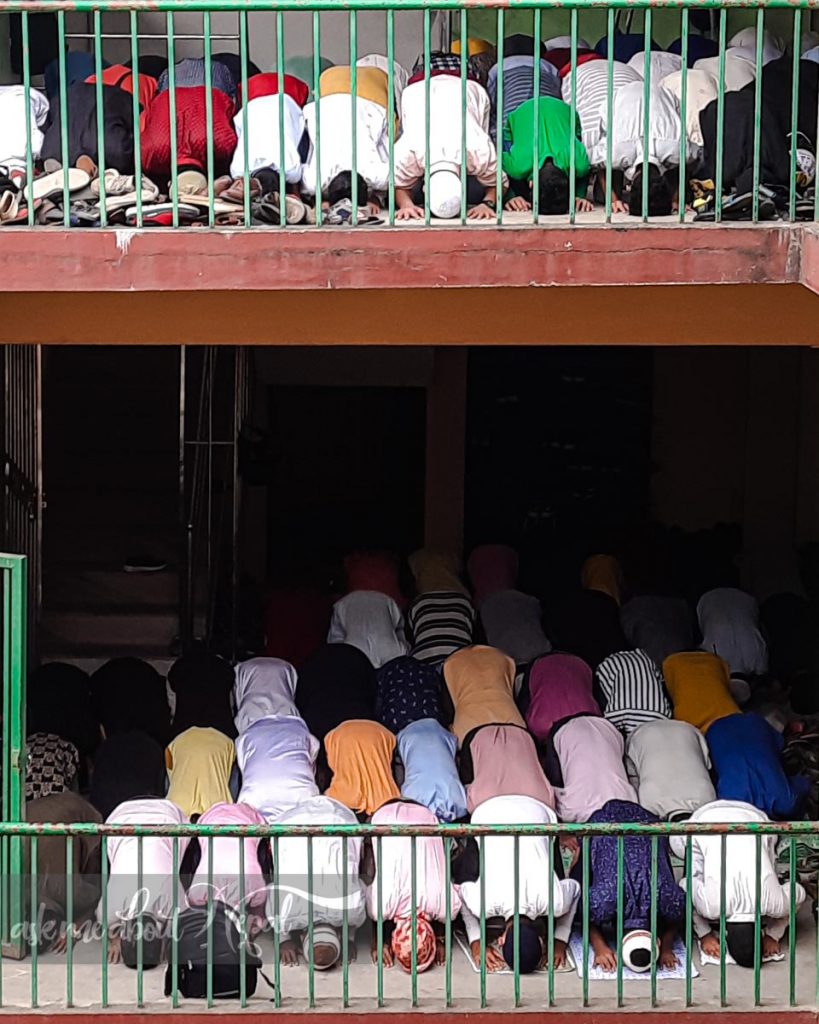
Last Friday Ramzan prayer at Jame Masjid, Kathmandu, Nepal.
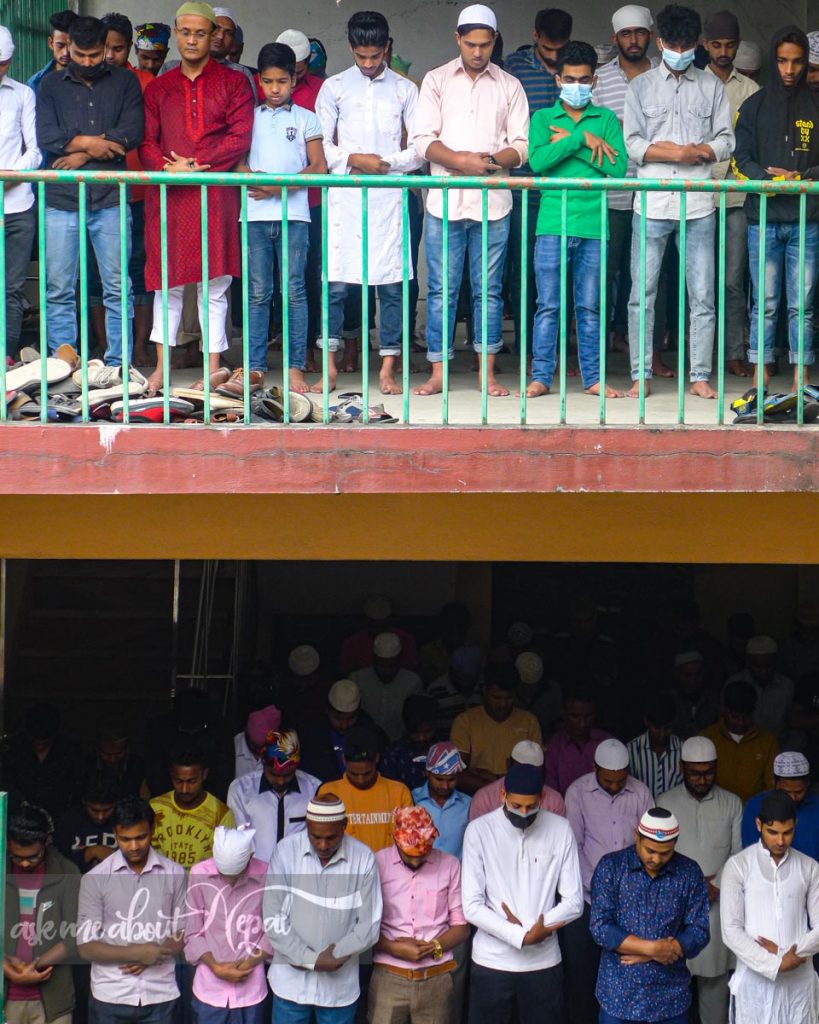
Last Friday Ramzan prayer at Jame Masjid, Kathmandu, Nepal.
Father and son wear a crochet Kufi, an Islamic skullcap to Jame Masjid in Kathmandu on the occasion of Ramzan. Its called “Topi” in Nepali and Hindi and Taqiyah in Arabic. Nepal. Muslim men wear it for religious purposes, it is believed that the Islamic prophet Muhammad used to keep his head covered, therefore making it mustahabb (i.e., it is commendable to cover the head in order to emulate him).

Father and son wear a crochet Kufi, an Islamic skullcap to Jame Masjid in Kathmandu on the occasion of Ramzan. Its called “Topi” in Nepali and Hindi and Taqiyah in Arabic. Nepal. Muslim men wear it for religious purposes, it is believe that the Islamic prophet Muhammad used to keep his head covered, therefore making it mustahabb (i.e., it is commendable to cover the head in order to emulate him).

Father and son wear a crochet Kufi, an Islamic skullcap to Jame Masjid in Kathmandu on the occasion of Ramzan. Its called “Topi” in Nepali and Hindi and Taqiyah in Arabic. Nepal. Muslim men wear it for religious purposes, it is believe that the Islamic prophet Muhammad used to keep his head covered, therefore making it mustahabb (i.e., it is commendable to cover the head in order to emulate him).

Muslim devotees buying Sewaiya, the semolina noodles, dates and ruhafza drinks at a mini market outside Jame Masjid in Kathmandu, Nepal.

Vendor selling Sewaiya, the semolina noodles, dates and ruhafza drinks at a mini market outside Jame Masjid in Kathmandu, Nepal.
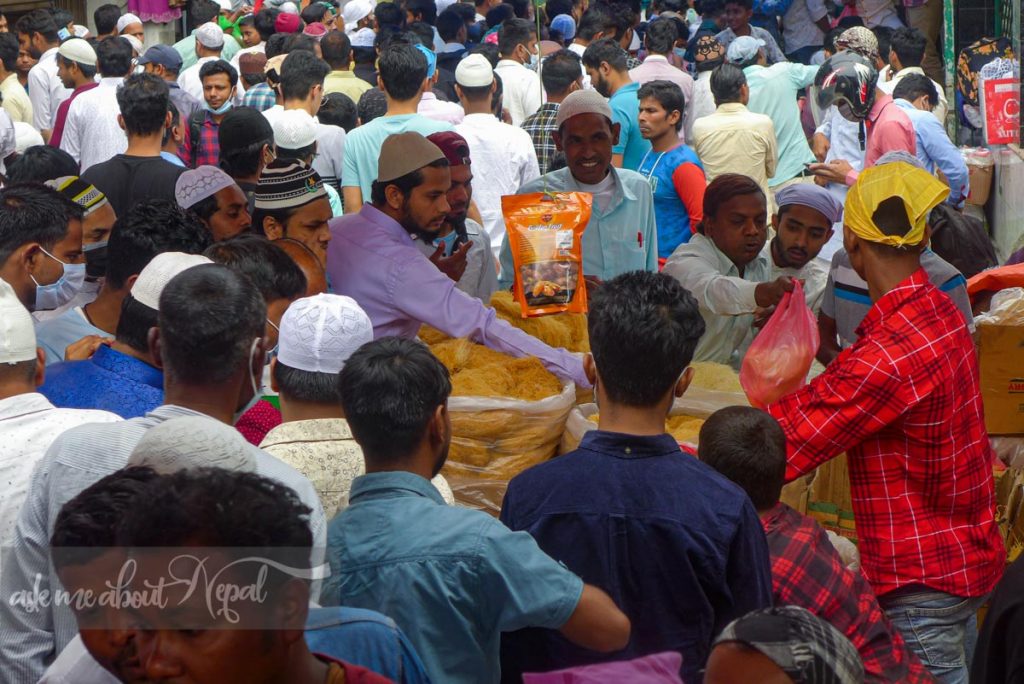
Muslim devotees buying Sewaiya, the semolina noodles after the friday prayer at Jame Masjid, Kathmandu, Nepal.
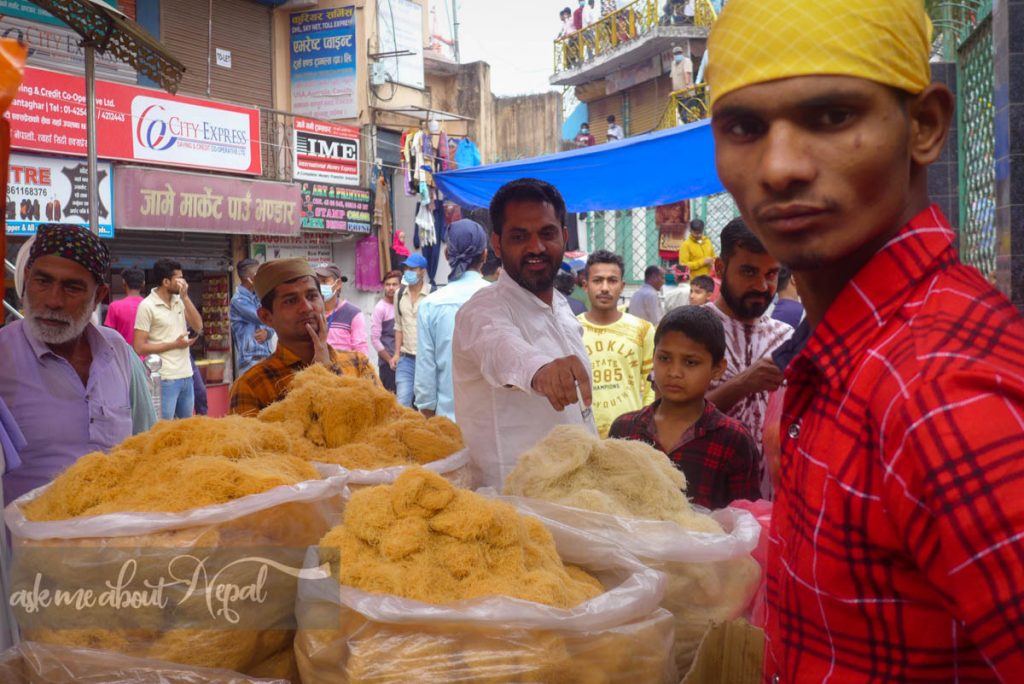
Muslim devotees buying Sewaiya, the semolina noodles, dates and ruhafza drinks at a mini market outside Jame Masjid in Kathmandu, Nepal.

Muslim devotees buying Sewaiya, the semolina noodles, dates and ruhafza drinks at a mini market outside Jame Masjid in Kathmandu, Nepal.

Father and son wear a crochet Kufi, an Islamic skullcap to Jame Masjid in Kathmandu on the occasion of Ramzan. Its called “Topi” in Nepali and Hindi and Taqiyah in Arabic. Nepal. Muslim men wear it for religious purposes, it is believe that the Islamic prophet Muhammad used to keep his head covered, therefore making it mustahabb (i.e., it is commendable to cover the head in order to emulate him).

Father and son wear a crochet Kufi, an Islamic skullcap to Jame Masjid in Kathmandu on the occasion of Ramzan. Its called “Topi” in Nepali and Hindi and Taqiyah in Arabic. Nepal. Muslim men wear it for religious purposes, it is believe that the Islamic prophet Muhammad used to keep his head covered, therefore making it mustahabb (i.e., it is commendable to cover the head in order to emulate him).

Muslim wear crochet Kufi, an Islamic skullcap to Jame Masjid in Kathmandu on the occasion of Ramzan. Its called “Topi” in Nepali and Hindi and Taqiyah in Arabic. Nepal. Muslim men wear it for religious purposes, it is believe that the Islamic prophet Muhammad used to keep his head covered, therefore making it mustahabb (i.e., it is commendable to cover the head in order to emulate him).
Reference
- History of Ramadan
- History of Ramadan, Muslim Aid
- Roza, Ramadan, Ramzan: There is more to the month of fasting than how it is spelled

4 comments
Well written!! This is clear, concise, and complete!
Thank you for your kind words, they keep us motivated.
Happy Ramzan to all Muslims and non-muslims.
Best wishes too